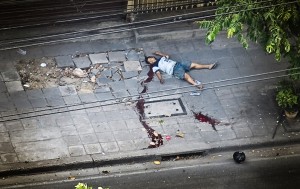Answering the Call of History in Thailand
 Foreign Minister Surapong Tovichakchaikul is on the verge of signing a document that might change the course of Thai history. Following a visit to Bangkok by officials from the International Criminal Court (ICC), the government is now considering whether to issue a declaration that would give the ICC jurisdiction over crimes against humanity committed in Thailand in April and May 2010 (see here for an explanation of the process). This could be a major turning point in Thailand’s eighty-year struggle for democracy.
Foreign Minister Surapong Tovichakchaikul is on the verge of signing a document that might change the course of Thai history. Following a visit to Bangkok by officials from the International Criminal Court (ICC), the government is now considering whether to issue a declaration that would give the ICC jurisdiction over crimes against humanity committed in Thailand in April and May 2010 (see here for an explanation of the process). This could be a major turning point in Thailand’s eighty-year struggle for democracy.
As the Foreign Minister has stated, giving the ICC jurisdiction over the abuses committed in 2010 can help ensure that the victims, having already been deprived of their lives, their rights, their freedoms, or their family members, will not be denied justice, as the victims of state violence always have in the past. Unlike the massacres of 1973, 1976, and 1992, there is now a real possibility that the deadly government crackdowns of April and May 2010 will be properly investigated, and that those responsible for committing crimes will be held to account.
There is, however, more at stake for Thailand as a nation. As Prof. Thongchai Winichakul explained in a letter to the ICC a few months ago, massacres of civilians have been committed regularly, over decades, and always for the same purpose: to deny the Thai people their basic right to self-determination. The cover-up of the crimes committed by the state in 1973, 1976, and 1992, in turn, has not only deprived the Thai people of their right to know the truth, but has virtually guaranteed that the same heinous crimes would be committed again.
Impunity has given those who refuse to acknowledge the legitimacy of the democratic process the power to bully elected governments, stage military coups, and, whenever faced with popular opposition, murder scores of demonstrators. Not all crackdowns have produced the intended results, causing in some instances the collapse of governments that authorized the army to fire on its citizens. The fact, however, that state officials have always gotten away with killing civilians has kept Thailand trapped in its vicious cycle of elections, coups, and massacres for the last forty years.
There are troubling signs that Thailand could be headed for another iteration of the same cycle. After leading an anti-government demonstration, retired General Boonlert Kaewprasit was quoted in the press not simply demanding that the military stage another coup, but suggesting that any opposition could be dealt with by “closing the country” for a few years, presumably until those who stand in the way have been thoroughly cowered or eliminated. These comments underscore the fact that it is only by ending impunity that future episodes of state violence can be prevented.
The involvement of the ICC offers the best chance Thailand has had in decades to break free of its vicious cycle. Not only would an ICC investigation finally impress upon local authorities that they can no longer take for granted the impunity they have historically enjoyed. By focusing the eyes of the entire world on the situation in Thailand, the ICC’s involvement is likely to forestall attempts to topple democracy, which have been staged in the past with the expectation that the military could violently suppress those brave enough to rise up in its defense. In turn, the Thai establishment’s hold on the democratic process might finally be broken, as its capacity to impose its will on popularly elected governments has always relied on the implicit threat of military force.
Granting the ICC jurisdiction over the events of April and May 2010 is not a partisan act, for the ICC will investigate those responsible for committing crimes irrespective of whether they were members of the government, the opposition, or a possible “third hand.” Far from bringing “dishonor to Thailand,” as the Chairman of the failed Truth for Reconciliation Commission recently suggested, taking this unprecedented step to end impunity would re-affirm Thailand’s commitment to its international obligations, the rights of its citizens, and a struggle for democracy eighty years in the making. Under the circumstances, nothing could be more patriotic than answering the call of history.











